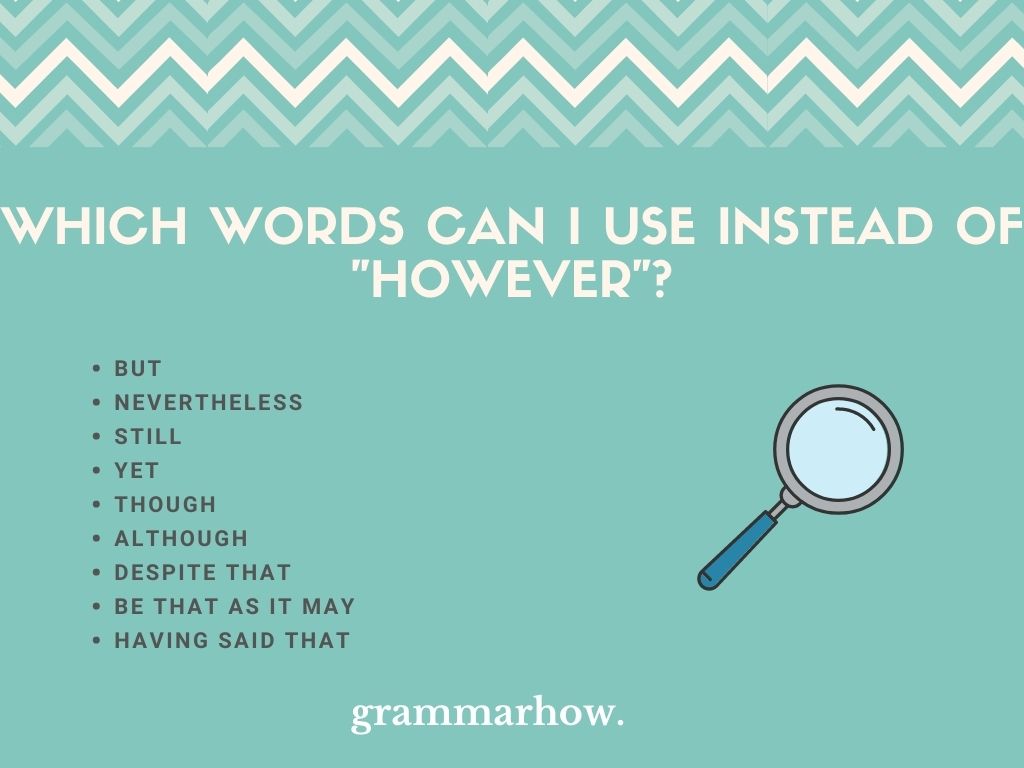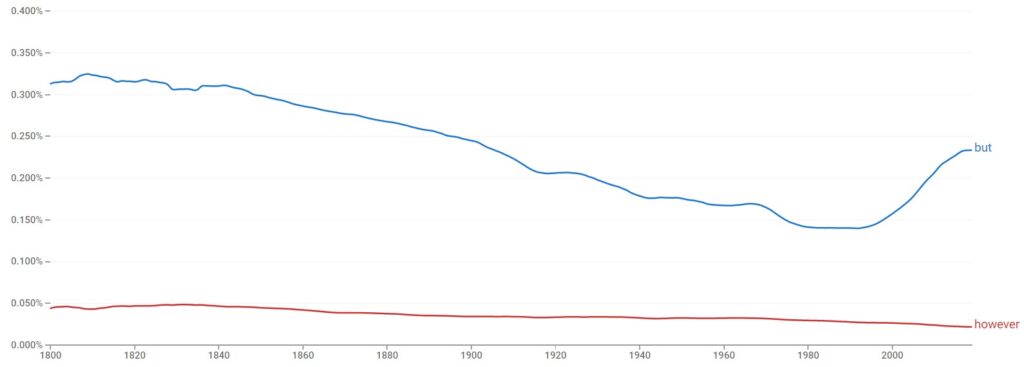“However” is undoubtedly a great word to use to counter a previous point you’ve made in writing. It can be somewhat overdone, which is why we think it’s time to look at some synonyms for it. This article will explore all the best alternatives for “however.”
Which Words Can I Use Instead Of “However”?
There are plenty of options to replace “however,” each one offering a different way for you to introduce a counterpoint or idea. This article will look at the following:
- But
- Nevertheless
- Still
- Yet
- Though
- Although
- Despite that
- Be that as it may
- Having said that

The preferred version is “but” because it’s the most common one seen in English. Most people know what it means, and it’s easy to read on a page (since it only features three letters).
But
Another way to say however is by using “but,” and it’s perhaps the most popular choice to do so.
“But” works well when we want to introduce a counterargument while keeping the text light and easy to comprehend. It’s the quickest way to use “however” and doesn’t need to be used in more formal contexts.
Generally, “however” is a formal word. We mostly use it in articles or writing designed to capture the formal audience’s attention. “But” isn’t as strict with its usage, and you can find it equally in informal and formal writing styles.
You might see “but” in some of the following ways:
- I liked that idea, but I don’t think it’s wise to continue talking about it.
- They tried hard to find the gold, but it was to no avail.
- This mission was a resounding success, but there is still more to find out there.
Nevertheless
Next, we come to “nevertheless,” which is a slightly less common phrase that works in formal situations.
“Nevertheless” and “nonetheless” are interchangeable and mean the same thing. You can use either to introduce a counterargument from the previous point.
Just like most of the words on this list, “nevertheless” is an independent clause that we use to include more information on the previous point, which means we need to include correct punctuation.
The correct punctuation choices include a semi-colon or a period before “nevertheless” and a comma after it.
- They worked hard for what they achieved; nevertheless, people looked down on them.
- You shouldn’t have said that to me; nevertheless, I will have to act on it accordingly.
- There are plenty of things wrong with this project; nevertheless, he will work on it.
Still
“Still” is one of the best choices to replace “but,” and many native speakers use the two interchangeably throughout their writing to keep things unique and creative.
“Still” works well to introduce a counterpoint and comes with the same punctuation needs as “however.” It means the same as “but” but is used as an independent clause to introduce a new idea to an argument or qualify a previous one.
“Still” is one of the easiest words on this list to use, and it doesn’t always have to introduce a counter idea. Instead, it can reaffirm the previous statement, though it’s rare to see it used in this way.
- No one could beat them. Still, she thought her team stood a good chance.
- You should keep quiet while I work. Still, I don’t reckon you’ll be too fond about doing that.
- There is much to do today; still, I don’t see a way to get it all done.
Yet
“Yet” and “but” are synonymous. They use the same language rules, which helps many writers use them. “Yet” is definitely a better choice to replace “but” than “still” is, which a lot of people overlook.
“Yet” only needs a comma to work in a sentence, just like “but.” We can use it whenever we’re introducing a point that doesn’t agree with the previous one stated.
People often find “yet” easy to use because it’s quick to say and only consists of three letters (much like “but”).
- I don’t see you helping, yet I hear you complaining an awful lot.
- We must work together on this, yet you insist on ignoring our commands.
- The government works in mysterious ways, yet they always make their mistakes popular in the media.
Though
“Though” is another common choice which we often see instead of “however.” Many people think it works in the same way as “although.” It’s simply a shorter version of “although” in the case of countering an argument.
“Though” is a great choice, like “yet” and “but,” which only requires a comma to work.
You will find “though” written quite a lot in English when introducing a counterpoint, and here are some examples of how it might look:
- I can see where you’re coming from, though I don’t much like your idea.
- There was a lot of money in the project, though they weren’t keen on telling us that.
- We found what we were looking for, though we weren’t best pleased with the result.
Although
“Although” is identical to “though.” We use both words for the same reason, and it seems that “though” has evolved over time to replace “although.”
“Although” is a great synonym, though it’s clear that “though” is becoming the more popular choice of the two. Both follow the same language rules, making them easier to use than “however.”
“Although” is an old-fashioned word, and many native speakers think the “al-” prefix is redundant and unnecessary. For that reason, “though” is more common today.
- I’d like to take you to dinner, although I don’t think you’ll agree to that.
- There have been many reports of injuries in this area, although the police haven’t confirmed anything suspicious.
- The news is full of lies, although no one is sure how or why they get there.
Despite That
“Despite that” is the first alternative way of saying “however” that uses more than one word in this list. We like it because it works well in more formal situations.
“Despite that” is a formal phrase. We use it to talk about a counterargument from the previous point raised, and many essays are elevated in quality when using a phrase like “despite that.”
While many of the one-word options above are great for both formal and informal cases, “despite that” is mostly only for formalities. That makes it the ideal candidate for essay writing, research papers, and work emails.
- The findings have proved many things wrong about this study; despite that, I’m still willing to progress with my initial hypothesis.
- You could find faults wherever you look. Despite that, the world is still beautiful in its own way.
- I have found many discrepancies in the profit register. Despite that, I believe this work is dutiful and moral.
Be That As It May
“Be that as it may” is another phrase rather than a one-word choice. We use it in the same way as “despite that,” and it means that while the previous point means one thing, we’d like to raise another idea.
“Be that as it may” is another formal option that you’ll only find in those situations. It will rarely be used in a casual environment.
- We have yet to see results. Be that as it may, we will keep working towards them.
- You don’t know what you’re doing here. Be that as it may, you’ve got a right to see what we’re doing.
- Be that as it may, I don’t think you can talk to me in such a manner.
Having Said That
“Having said that” is synonymous with “be that as it may,” to mean that, while we’re saying one thing, we’re about to raise a point that highlights the opposite.
Again, “having said that” is a formal choice, though it’s not quite as formal as some of the others.
- You shouldn’t be here. Having said that, I think you can help me.
- There are many more places to explore in this world. Having said that, studies show it’s unlikely that we’ll ever explore them.
- The solar system is a vast expanse of nothing. Having said that, I’m excited to see where space travel might take us.
What Does “However” Mean?
“However” means despite the previous statement. We use it when we want to talk about a contradicting idea to the one we just raised, even if that seems counterintuitive to the goal of our writing.
The definition of “however,” according to The Cambridge Dictionary, is “despite whatever amount of degree.”
Can You Say “But However”?
“But however” is never grammatically correct. It’s known as reduplication, where we use two words that have the same meaning. Ultimately “but however” means “but but” or “however however.” Both of those statements are grammatically incorrect.
Which Is Better: But Or However”?
According to this graph, “but” is more popular than “however,” making it the more recognized and thus better choice than “however.”

Many people prefer using “but” because it’s much easier to find a place to write it in your writing. Also, because it comes with less strict punctuation rules, it’s easier for people still trying to learn the language to use it effectively.
You might also like: How To Use However In The Middle Of A Sentence (9 Examples)
